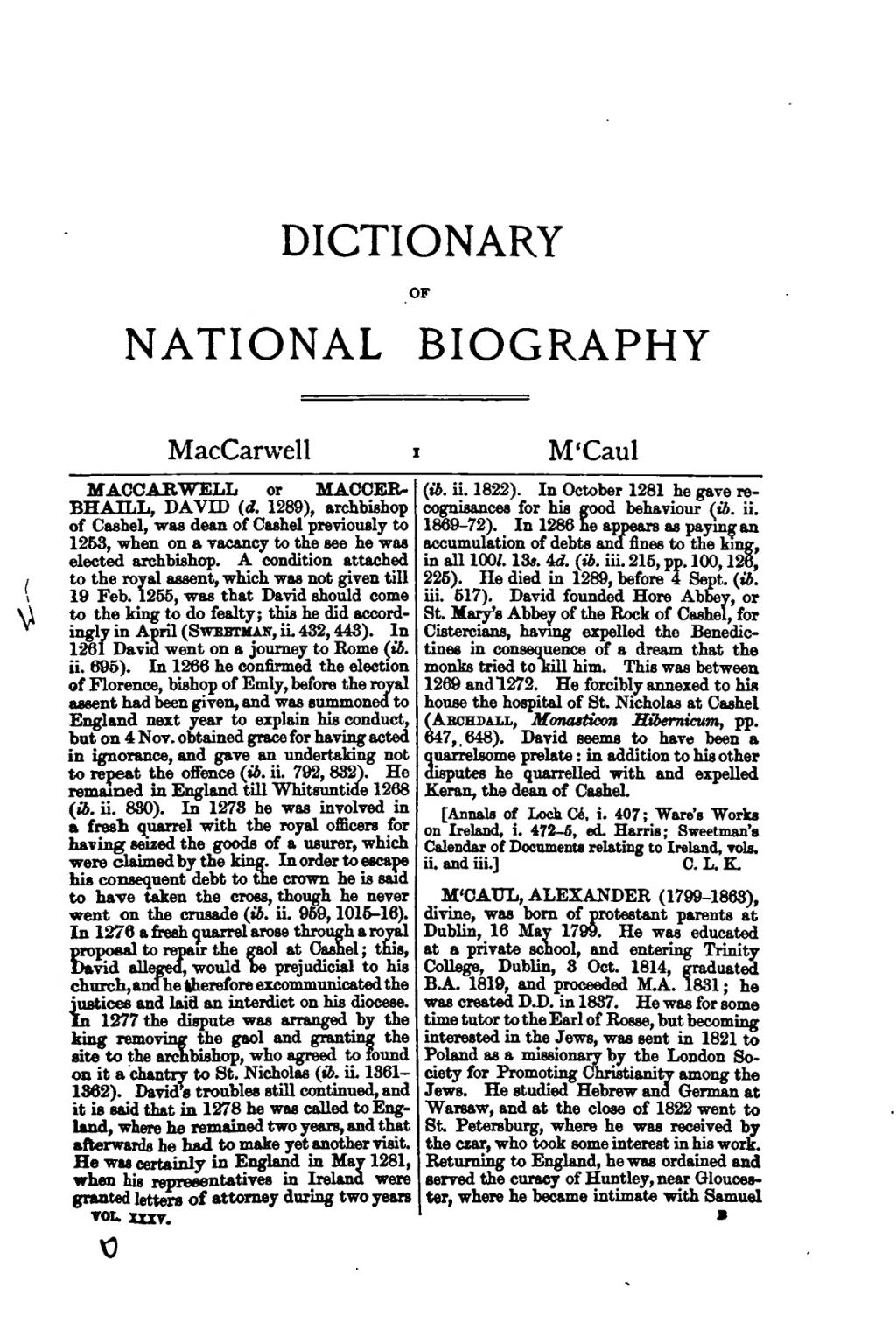DICTIONARY
of
NATIONAL BIOGRAPHY
MACCARWELL or MACCEBHAILL, DAVID (d. 1289), archbishop of Cashel, was dean of Cashel previously to 1353, when on a vacancy to the see he was elected archbishop. A condition attached to the royal assent, which was not given till 19 Feb. 1253, was that David should come to the king to do fealty; this he did accordingly in April (Sweetman, ii. 432, 443). In 1261 David went on a journey to Rome (ib. ii. 695). In 1266 he confirmed the election of Florence, bishop of Emly, before the royal assent had been had been given, and was summoned to England next year to explain his conduct, on 4 Nov. obtained grace for having acted in ignorance, and gave an undertaking not to repeat the offence (ib. ii. 792, 833). He remained in England till Whitsuntide 1268 (ib. ii. 830). In 1273 he was involved in a fresh quarrel with the royal officers for having seized the goods of a usurer, which were claimed by the king. In order to escape his consequent debt to the crown he is said have taken the cross, though he never went on the crusade (ib. ii. 959, 1015-16). In 1276 a fresh quarrel arose through a royal proposal to repair the gaol at Cashel; this, David alleged, would be prejudicial to his church, and therefore excommicated the justices and laid an interdict on his diocese. In 1277 the dispute was arranged by the king removing the gaol and granting the site to the archbishop, who agreed to found on it a chantry to St. Nicholas (ib. ii. 1361-1362). David's troubles still continued, and it is said that in 1278 he was called to England where he remained two years, and that afterwards he had to make yet another visit. He was certainly in England in May 1281, when his represenlatives in Ireland were granted letters of attorney during two years (ib. ii. 1822). In October 1281 he gave recognisances for his good behaviour (ib. ii. 1869-72). In 1286 he appears as paying an accumulation of debts and fines to the king, all 100l. 13s. 4d. (ib. iii. 215, pp. 100, 126, 223). He died in 1289, before 4 Sept. {ib. iii. 517). David founded Hore Abbey, or St. Mary's Abbey of the Rock of Cashel, for Cistercians, having expelled the Benedictines in consequence of a dream that the monks tried to kill him. This was between 1269 and 1272. He forcibly annexed to his house the hospital of St. Nicholas at Cashel (Archdall, Monasticon Hibernicum, pp. 647, 648). David seems to have been a quarrelsome prelate: in addition to his other disputes he quarrelled with and expelled Keran, the deau of Cashel.
[Annals of Loch Cé. i. 407; Ware's Works on Ireland, i. 472-5, ed. Harris; Sweetman's Calendar of Documents relating to Ireland, vols. ii. and iii.]
M'CAUL, ALEXANDER (1799–1863), divine, was born of protestant parents at Dublin, 16 May 1799. He was educated at a private school, and entering Trinity College, Dublin, 3 Oct. 1814, graduated B.A. 1819, and proceeded M.A. 1831; he was created D.D. in 1837. He was for some time tutor to the Earl of Rosse, but becoming interested in the Jews, was sent in 1821 to Poland as a missionary by the London Society for Promoting Christianity among the Jews. He studied Hebrew and German at Warsaw, and at the close of 1822 went to St. Petersburg, where he was received by the czar, who took some interest in his work. Returning to England, he was ordained and served the curacy of Huntley, near Gloucester, where he became intimate with Samuel
